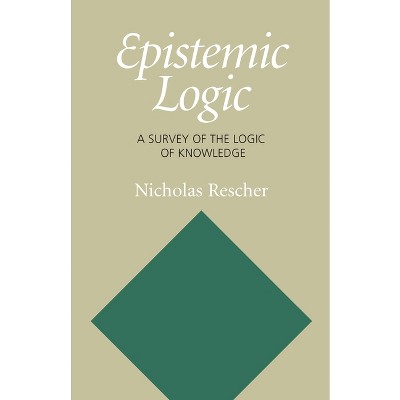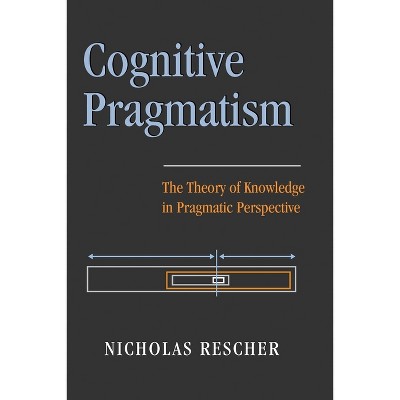Aporetics - by Nicholas Rescher (Paperback)

$50.00 when purchased online
Target Online store #3991
About this item
Highlights
- The word apory stems from the Greek aporia, meaning impasse or perplexing difficulty.
- About the Author: Nicholas Rescher was Distinguished University Professor of Philosophy at the University of Pittsburgh and co-chairman of the Center for Philosophy of Science.
- 176 Pages
- Philosophy, Epistemology
Description
About the Book
Rescher defines an apory as a group of individually plausible but collectively incompatible theses. Citing thinkers from the pre-Socratics through Spinoza, Hegel, and Nicolai Hartmann, he builds a framework for coping with the complexities of divergent theses, and shows in detail how aporetic analysis can be applied to a variety of fields including philosophy, mathematics, linguistics, logic, and intellectual history.Book Synopsis
The word apory stems from the Greek aporia, meaning impasse or perplexing difficulty. In Aporetics, Nicholas Rescher defines an apory as a group of individually plausible but collectively incompatible theses. Rescher examines historic, formulaic, and systematic apories and couples these with aporetic theory from other authors to form this original and comprehensive survey. Citing thinkers from the pre-Socratics through Spinoza, Hegel, and Nicolai Hartmann, he builds a framework for coping with the complexities of divergent theses, and shows in detail how aporetic analysis can be applied to a variety of fields including philosophy, mathematics, linguistics, logic, and intellectual history.Rescher's in-depth examination reveals how aporetic inconsistency can be managed through a plausibility analysis that breaks the chain of inconsistency at its weakest link by deploying right-of-way precedence based on considerations of cognitive centrality. Thus while involvement with cognitive conflicts and inconsistencies are pervasive in human thought, aporetic analysis can provide an effective means of damage control.
Review Quotes
Aporetics raises the question 'how do we proceed in the face of inconsistencies?' and the issues of truth, plausibility, reasoning patterns, the relation of belief to action. At this stage of his life, Rescher has written on all of these. What is fun to see is how he brings all the material together into a coherent whole. He is an extremely elegant thinker and writer and Aporetics is Rescher at his best.-- "Joseph C. Pitt, Virginia Tech"
An essay in philosophical methodology with much to recommend it. In addition to being eminently readable (on account of both its style and its length) it is also timely.-- "Philosophy in Review"
Extremely rich . . . to be praised for striking the right balance between prescribing 'general' reasoning techniques, and insisting that there will always be considerations specific to the particulars of an individual case.-- "Metascience"
Having coined the term 'apory, ' Nicholas Rescher takes up the topic of 'aporetic' reasoning. How are we to proceed when things individually plausible cannot all plausibly be true? Having revealed how this phenomenon pervades philosophy, he defines some of its main forms, and offers an applicable prescription.-- "Ernest Sosa, Brown University"
This work contributes to improved understanding of difficult problem situations, not only in philosophy, but in science, political history, and everyday life. Rescher's entertaining style and witty remarks will certainly make the reading enjoyable and enhance understanding.-- "Arto Siitonen, University of Helsinki"
About the Author
Nicholas Rescher was Distinguished University Professor of Philosophy at the University of Pittsburgh and co-chairman of the Center for Philosophy of Science. A member of the American Academy of Arts and Sciences, he served as president of the Eastern Division of the American Philosophical Association, the Leibniz Society of North America, the Charles S. Peirce Society, the American Catholic Philosophical Association, and the Metaphysical Society of America. Rescher was the author or editor of more than one hundred books, including Ignorance (On the Wider Implications of Deficient Knowledge), Philosophical Inquiries: An Introduction to Problems of Philosophy, and A Journey through Philosophy in 101 Anecdotes.Dimensions (Overall): 8.4 Inches (H) x 5.4 Inches (W) x .6 Inches (D)
Weight: .52 Pounds
Suggested Age: 22 Years and Up
Number of Pages: 176
Genre: Philosophy
Sub-Genre: Epistemology
Publisher: University of Pittsburgh Press
Format: Paperback
Author: Nicholas Rescher
Language: English
Street Date: August 24, 2009
TCIN: 92681890
UPC: 9780822960577
Item Number (DPCI): 247-07-9208
Origin: Made in the USA or Imported
Shipping details
Estimated ship dimensions: 0.6 inches length x 5.4 inches width x 8.4 inches height
Estimated ship weight: 0.52 pounds
We regret that this item cannot be shipped to PO Boxes.
This item cannot be shipped to the following locations: American Samoa (see also separate entry under AS), Guam (see also separate entry under GU), Northern Mariana Islands, Puerto Rico (see also separate entry under PR), United States Minor Outlying Islands, Virgin Islands, U.S., APO/FPO
Return details
This item can be returned to any Target store or Target.com.
This item must be returned within 90 days of the date it was purchased in store, shipped, delivered by a Shipt shopper, or made ready for pickup.
See the return policy for complete information.
Trending Poetry

$22.80
was $26.60 New lower price
5 out of 5 stars with 4 ratings










